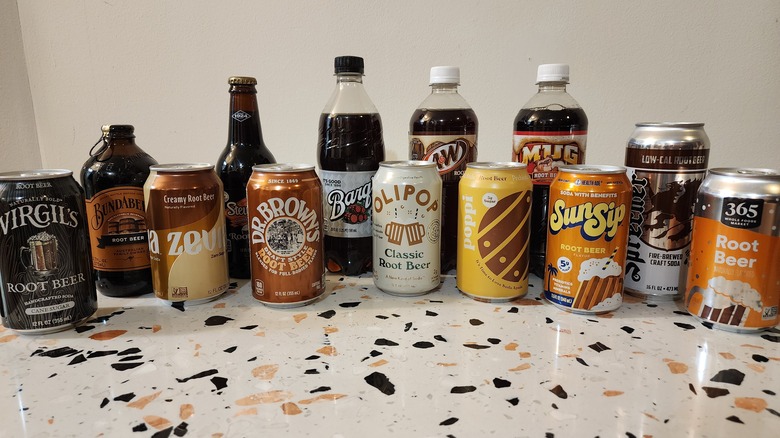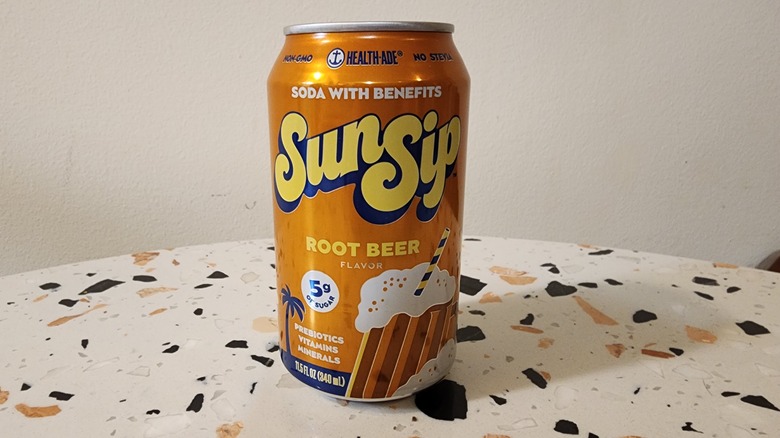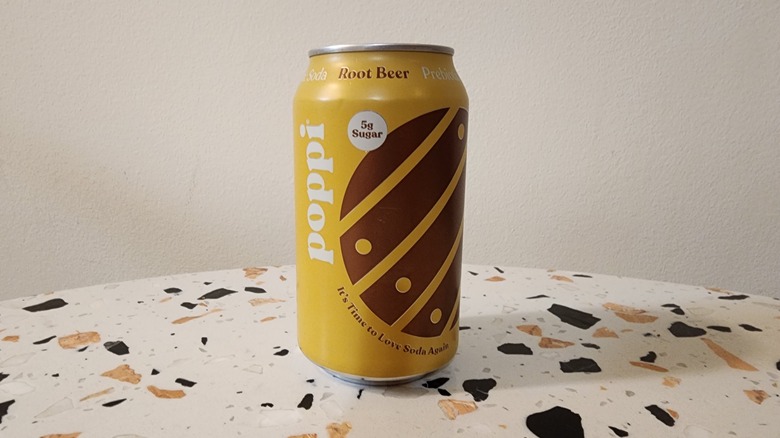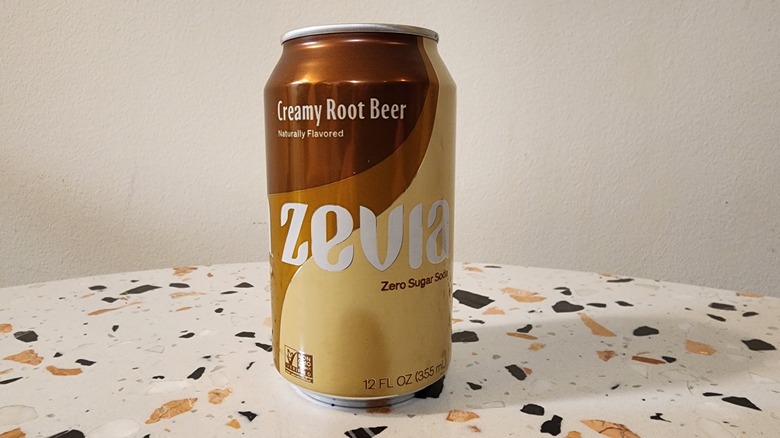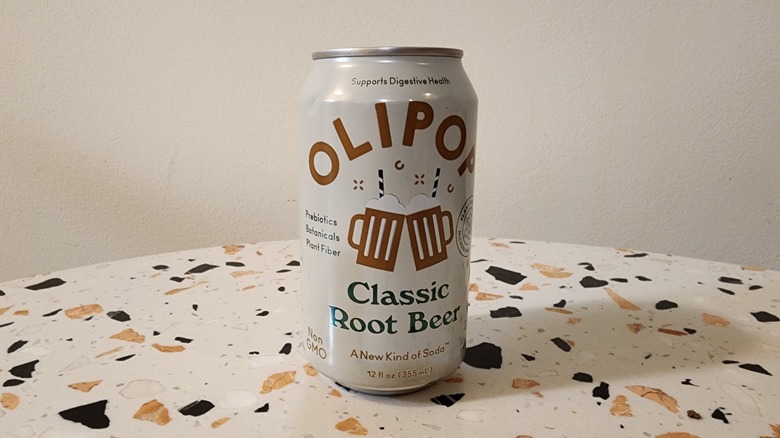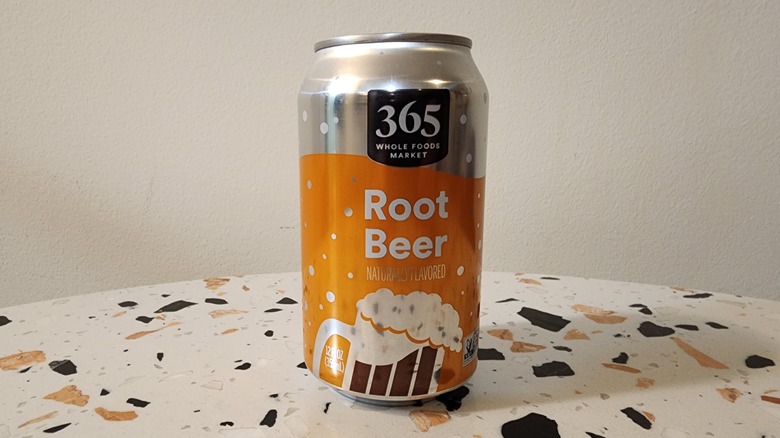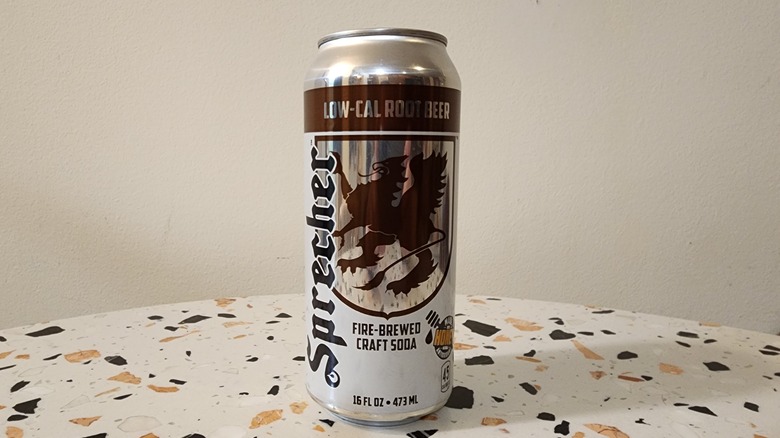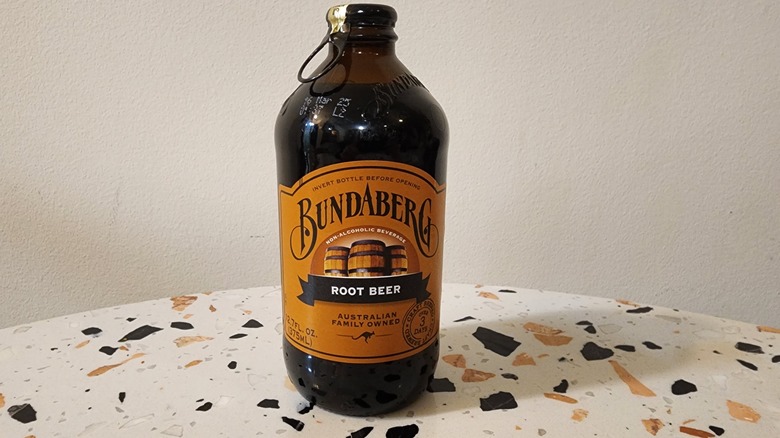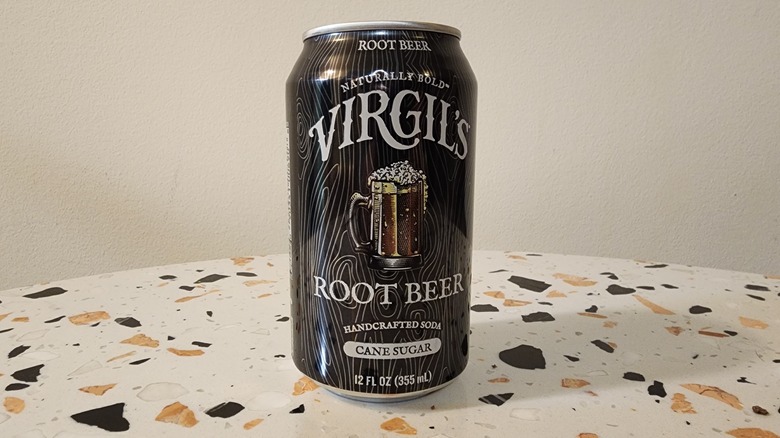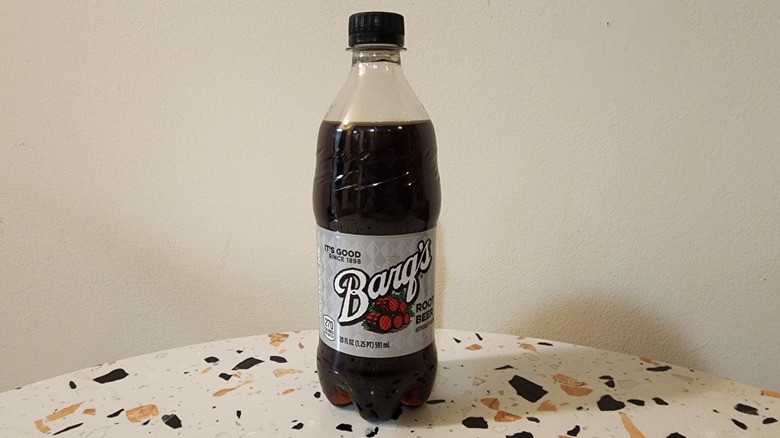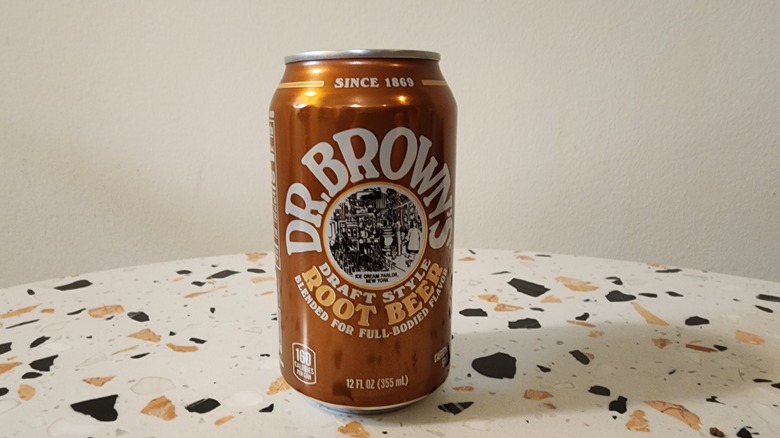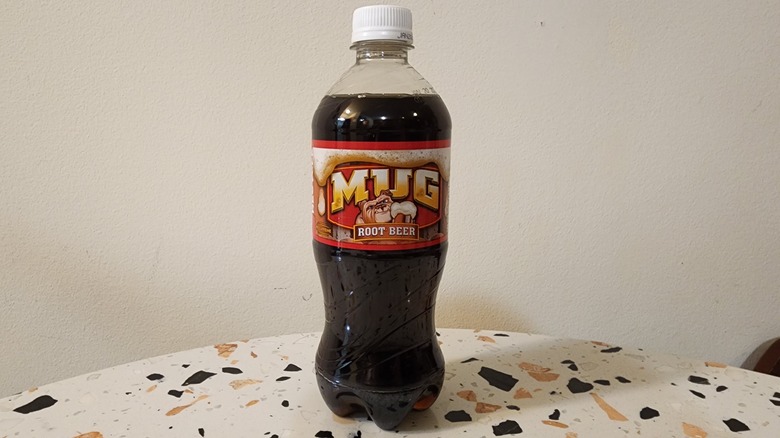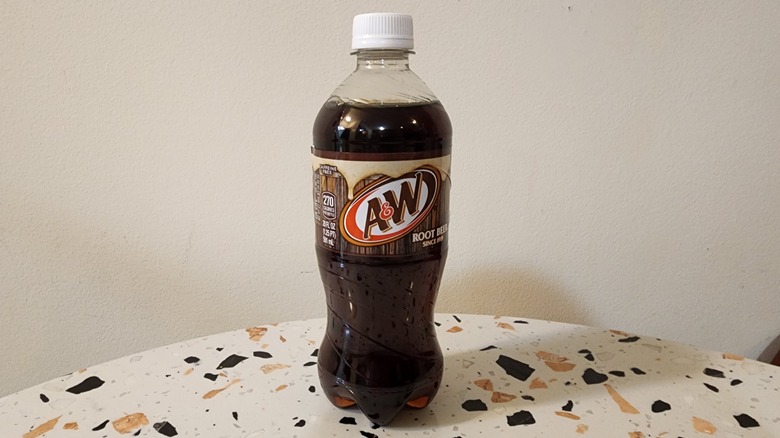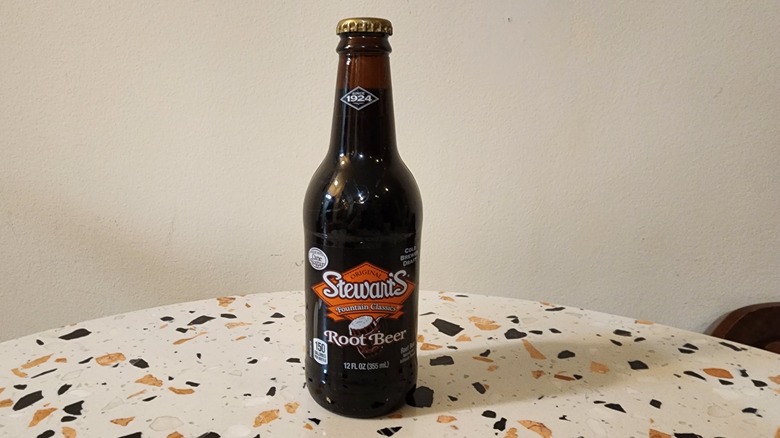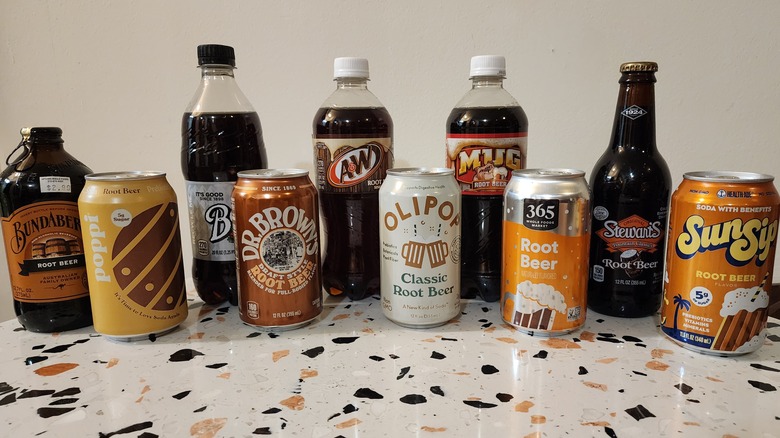A Blind Taste Test To Determine The Best Root Beer
We may receive a commission on purchases made from links.
I can't quite put my finger on it, but there's something that's just classic — iconic, even — about a good root beer. Root beer has been around for nearly two centuries, after all. While I'm less of a soda-drinker now than in my youth, root beer has always been my soft drink of choice. Maybe it's the delicate balance of sweet and spicy in its flavor profile or the frothy head and "beer" name that made it seem like a much more adult drink than Coca-Cola or Pepsi; or simply the fact that it makes for the perfect dessert should you top off a properly prepared, frosted glass of the soda with a scoop or two of vanilla ice cream.
With all that in mind, I wanted to figure out just which brand of root beer tops them all. To do so, I purchased a bottle or can of every variety I could find in New York City and blind taste-tested each, before following that with a second tasting at a later time. The point of this ranking is to determine which tastes the best. Price, calories, availability, and just about any other factor weighed very little — unless specifically noted — in this experiment.
13. SunSip
Finding its spot last on the list is Health-Ade's SunSip root beer. This low-calorie root beer forgoes stevia as a sugar replacement and instead uses fruit juice, monk fruit, and cane sugar (which comes out to less than 6 grams of sugar). Health-Ade also touts the soda as having gut-healthy prebiotics, vitamins C, B6, and B12, and such minerals as zinc and selenium. What it doesn't have, however, is a great flavor. While some reviews on its website claim this tastes "exactly like root beer," I have to strongly disagree. There seemed to be a clash of flavors, and I couldn't really identify any of them clearly. Then I looked at the list of ingredients and second on the list was apple juice. Once I saw that, things began to fall into place.
If you're looking for a funky, spiced, carbonated apple-flavored beverage with some purported health benefits, this might be for you. If you're looking for a root beer, you can safely skip this one. In my blind taste-testing, this just happened to be the last one I tried, so it had a lot of other beverages to stand up to and, boy, did this experiment end without a bang. I don't think I need to go on.
12. Poppi
The penultimate root beer on this list is another prebiotic soda — this time, it's Poppi. On the blind taste test the first flavor I got was that of artificial sweetener. While Poppi's root beer does contain stevia, it's lower on the ingredient list than the likes of organic cane sugar (and organic agave inulin), so the fact that this stood out was a disappointment.
More so of an issue than the type of sweetener was the fact that the classic root beer flavor was simply lacking. Once you get past the 25 calories and 5 grams of sugar, there really isn't much going for this soda. The ingredients list simply states "natural flavors," so I don't know what they used to create the root beer flavor profile but it seems in need of tweaking still. Like SunSip, even if you're counting calories and looking for a healthier soda substitute, this isn't worth it as there are better options to come. Poppi says I'm "deff gonna want to pick up some vanilla ice cream " to go with this soda, and they're not wrong — only I'm going to need to add some ice cream to help redeem the glass I've already poured.
11. Zevia
Coming in 11th place is Zevia's Creamy Root Beer. (Are you seeing that trend, yet?) Despite this being yet another low-cal soda (Zevia has 0 calories, in fact), there's a clear tier break between Poppi and Zevia in that I would drink this one again — in limited situations. Because of the stevia, you can tell this is a low-cal root beer but it has a stronger (and more typical) root beer flavor than the sodas listed lower on this list. In fact, Zevia compared favorably to the next soda on the list but this gets a major exception in that this ranking includes a factor other than flavor, forcing me to drop it one spot.
Zevia does not use added colors or dyes so when you pour a glass of root beer and it looks more akin to a lemon-lime soda, it just plays a trick on your brain. I wouldn't even want to consider how this would look in root beer float form. My other knock is this is branded "Creamy Root Beer," and I got nothing in the flavor to indicate anything creamy. Again, I only have "natural ingredients" to go by, so perhaps it's just marketing that directed this, but it's a letdown on that front nonetheless. In all, I will probably drink Zevia root beer again but I refuse to drink it from anything other than the can, so I can at least pretend it looks like a root beer.
10. Olipop
Olipop's Classic Root Beer marks the last of the four healthier soda substitutes that fill out the last spots on this definitive ranking. Like Zevia below, Olipop is much more worthwhile than the two sodas at the very bottom of this list — and I would happily drink this again whether I was dieting/counting calories or not.
In a glass, this actually had a good, spicy aroma and that was backed up in the taste test. Perhaps through its proprietary "Olismart" blend of flavors (including cassava root fiber, chicory root inulin, Jerusalem artichoke inulin, marshmallow root, and kudzu root, among others), that typical root beer flavor I was looking for actually comes through. Better yet, there's hardly a trace of artificial sweetener. Instead, Olipop appears to use cassava root syrup alongside stevia leaf extract to provide sweetness. I also think it is clever that Olipop uses salt in the recipe to balance out the flavor profile and provide a hint of savoriness. Other good flavors include natural vanilla and sweet birch extract.
9. 365 by Whole Foods Market
Whole Foods' 365 store brand root beer does not use high fructose corn syrup; however, it uses invert cane sugar, which has similar nutritional values of other common sweeteners like table sugar or corn syrup. So, while this one does have a bit of an unexpected flavor profile as a result of that sugar option, it does not come with the health benefits of other replacement sweeteners. That said, even though this clocks in at 180 calories, its ranking has very little to do with its artificial flavor and the typically accompanying lack of calories. The reason this ranks so low is because its flavor is simply lacking. While it's not overly sweet, that's the dominant flavor profile, lacking the much-needed balance provided by those earthy, spicy flavors.
A nice, cold glass will certainly do in a pinch (especially when you consider a 12-pack cost me only slightly more than $8), but this root beer isn't breaking into my list of go-to options. As I still have 11 cans left, I'll definitely drink them and I'll be content to do so. Perhaps I only wish I had 11 cans of some of the forthcoming root beers instead.
8. Sprecher
I've got to be frank: This self-proclaimed root beer enthusiast had never heard of Sprecher before embarking on this experiment. At the store I saw a can of Sprecher Low-Cal Root Beer and just assumed that was its standard product. Sprecher (among a handful of flavors), in fact, has a classic "Root Beer Soda" as well as the "Low-Cal Root Beer Soda." So, while I've tried other low-calorie options, I did not include any diet or sugar-free varieties of any brands that make both. That all said, this was a really solid root beer and now knowing Sprecher makes a non-low-calorie option, I definitely want to give that a try.
Through "a touch of pure honey" and vanillin, alongside an unlisted selection of natural and artificial ingredients, Sprecher's Low-Cal Root Beer actually has a pretty solid flavor. The company says the root beer — like all of its sodas — is fire-brewed in a gas-fired kettle. This is, from what I can tell, intended to give the soda a creamy, silky texture. I don't know if this had any better texture or any more creaminess than the others on the list, but I guess it's cool to drink a fire-brewed soda, for whatever that's worth, but I digress. Sprecher, low-calorie or not, is definitely something I'd drink again — and I'll be keeping an eye out for its classic root beer soda.
7. Bundaberg
Classically an American beverage, this next root beer actually hails from Australia. Perhaps this gives the family-owned company permission to do things a bit differently but Bundaberg root beer certainly stood out among the baker's dozen I sampled. Bundaberg incorporates cane sugar, molasses, ginger root, sarsaparilla root — the original flavor of root beer — licorice root extract, and vanilla bean extract, and all of that equates to a properly natural and spicy soda. My one issue is that it's on the sweeter side, which is just about the only reason it ranks so low.
I will definitely drink this again and I expect that as I try this more I will find myself liking it more and more. I also liked that this "beer" is actually brewed. Bundaberg says this is "to extract maximum flavor" but perhaps because of the inclusion of yeast and this brewing process, there's something to this soda that has a distinct "beer" quality to it. (Despite that, this is a non-alcoholic beverage and unlike some ginger beers, there is no trace of alcohol in this soda.)
6. Virgil's
Like Bundaberg, I very much expect myself to be buying Virgil's root beer much more often going forward. I found the can to be very carbonated, but it had a very strong, very typical root beer flavor. Although it doesn't list what they are, Virgil's says it uses 15 roots and spices in its root beer as well as cane sugar as a sweetener. In fact, Virgil's uses only natural ingredients, which, while it doesn't factor heavily (hardly at all, really) in this ranking, is still good to know.
In all, I thought it to possess a great balance of sweet and spiciness. This is, if someone hasn't drunk a root beer before, on the shortlist of sodas I'd give them. Even more so than Bundaberg, I can see Virgil's jumping up my personal list in the future the more times I try it. For now, however, it will have to settle in at No. six — the highest ranking root beer of the cohort I was less familiar with prior to this ranking.
5. Barq's
And here we begin the segment of the list that mostly comprises the most common brands. I was hoping one root beer that I hadn't tried before would dethrone what I typically considered my favorite root beer but, perhaps due to the frequency in which I've had all the root beers from this point on, I heavily associate what I expect in a root beer from this grouping. I suppose for that reason it's why they all claimed the top spots. And coming in fifth place is Barq's. A childhood favorite, I would still drink this any day (well, any day I was in the mood for a root beer).
First introduced in 1898, this stands the test of time. Sure, it has high fructose corn syrup to go along with unlisted artificial (note this is listed first) and natural flavors, but Barq's is about as classic as root beer gets. One interesting thing about it, however, is that unlike most root beers, it contains caffeine — about 22 milligrams per 12 fluid ounces — something most root beers don't have. While that didn't factor in the ranking, it's higher-than-typical level of carbonation (something I'm not particularly fond of) is what sets this half a step below the root beers still to come.
4. Dr. Brown's
Dr. Brown's is a root beer I only have every once in a while. Why? No particular reason. Is that going to change going forward? You bet! When you pour it, you get those typical aromas, sweet and spicy. The taste test confirms all of that, with hints of licorice and vanilla (as well as wintergreen, supposedly, but I didn't get that). There really isn't much to say about this one other than it's a classic root beer that checks all the boxes. From its original sweetened celery seed soda that launched the company in 1869, to its popularization of cream soda, Dr. Brown's just seems to do every soda right.
This is readily available on the East Coast, but if should be able to find it across the U.S., especially in Jewish delis. If you're unfamiliar but are craving a classic root beer, trust that Dr. Brown's has the prescription.
3. Mug
Definitively ranking root beers four through two was a bit of a challenge. Honestly, on any given day this order might shift around a little bit, but at the time of writing, Mug slightly edges out Dr. Brown's. Like Barq's, Mug was another staple in my childhood (as was the next soda on this list) and perhaps that flavor-memory is why this ranks so high but, to me, this has all that you want in a root beer. It's sweet, it's got a good bit of that earthy, spicy flavor.
It has a great texture (being not as carbonated as Barq's) and it has quite a bit of foam (thanks to the inclusion of quillaia extract), which is another important characteristic of root beer. I've had many a Mug in my day (including as a root beer float) and I will very certainly have many more in my future. Not much else needs to be said here.
2. A&W
A&W root beer is a tricky subject. Most notably, A&W exists in different forms in the U.S., Canada, and the chain of A&W fast food restaurants found in both countries. For the purpose of this ranking, I am considering the A&W you can buy in bottles and cans in the U.S. (In Canada, the ingredients differ, using cane sugar in lieu of high fructose corn syrup, while restaurant storefronts reportedly make the root beer fresh on site — which might not be as tricky as you think — and license the name from Keurig Dr Pepper.) That all aside, A&W has a creamy texture, a caramel, spicy flavor, and great foam — all things you want in a root beer. When I crave a root beer, this is often what's at the top of my list.
I can't imagine if you find yourself at an A&W restaurant — I haven't been in many, many years — that the flavor would let you down, nor would its Canadian counterparts (this one might even get a bump from the natural cane sugar). Maybe I need to go away for a bit and track down some of these other varieties to see how they hold up. Either way, I'll still have the classic A&W I've long been familiar with to come back to.
1. Stewart's
Maybe the glass bottle gives it some extra flavor, or maybe it's that many New York City-area pizzerias sell it and, so, it's become colloquial with a quick but tasty any-time meal, but Stewart's makes great sodas and its root beer is right there at the top of the list. It starts with the aroma, where you get that expected sweet and spicy scent, which is amplified when you take a sip. It's not overly or insufficiently carbonated; its sweet but not too sweet (benefiting from cane sugar); has all the spicy, earthy flavors (due to yucca extract, among others) you want; and has a smooth, creamy foam (quillaia extract makes another appearance) and texture. It's about as well-rounded as a root beer can be.
I've realized I only buy this when I'm in a pizzeria and that's simply not enough. This ranking has made me realize how top-notch Stewart's actually is and that it's justifiable to walk into a pizza joint, grab a Stewart's from the fridge, pay for it, and leave without ordering any pizza.
Methodology
I blind taste-tested each of the above 13 root beers back-to-back, took notes on each and came up with a working ranking. I then sampled each again a second time to see if my opinions had changed (in which case, some had). The dominating factor was flavor; in particular, did the soda check the boxes of what I typically associate a root beer to be: Was it sweet (but not overly so); was it earthy, spicy, and natural-tasting? I also considered the aroma, texture, and froth of each soda, which, although these don't necessarily affect the flavor, they do affect the drinking experience. As noted, in one situation, I also factored in the color of the root beer.
There are many classic or popular root beers I was not able to locate for this story — namely, Jones, Boylan, and IBC. There are others that are seemingly not as regional to New York, like Dad's, Red Arrow, Frostie, and many others. I also only purchased each brand's signature or classic root beer variety (with one accidental exception), whether that's a full- or low-calorie offering.
